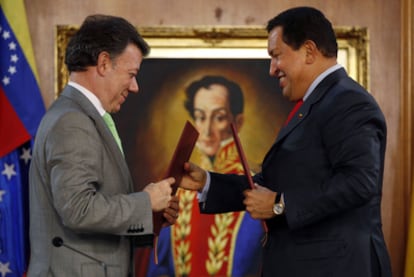Colombian police find connections between former senator and rebels
Emails renew questions about Venezuela's involvement in Colombia's affairs
Colombian police say they have new evidence to charge a former leftist senator of having ties to guerrilla rebels as well as communications supporting allegations that her campaign received money from the Venezuelan government.
Piedad Córdoba, who was fired by the Senate earlier this month for alleged ties to the Revolutionary Armed Forces of Colombia (FARC), claims she is the victim of political persecution and will not seek asylum in another country because she has nothing to hide.
On Friday, police said that they had uncovered a barrage of email messages found in the computer of the FARC's late commander "Mono Jojoy," who was killed in an ambush two months ago. In the exchanges, Córdoba uses the aliases "Gaitán" or "Teodora Bolívar," police say. Although a judge has yet to approve their authenticity, the messages were leaked to the Bogotá daily El Tiempo. In one dated September 14, 2008, another commander, Iván Márquez, wrote that "Gaitán" tipped them off about an upcoming military operation.
"I am not familiar with the emails or how the attorney general got hold of them," Córdoba said. "What I see is a recycling [of rumors] and persecution that I plan on fighting in my own country," she said.
Investigators say they also intercepted emails, web chats and other documents alleging that a group of Córdoba's advisors received millions of dollars from Venezuela to help finance her campaign and work. Among the evidence are money orders from Venezuela's central bank and Banco Microfinanciero de Venezuela.
While she was a senator, Córdoba traveled to Venezuela on various occasions, meeting with President Hugo Chávez. She also served as a mediator between the FARC and the Colombian government, raising suspicions among the country's conservative sectors.
The scandal comes as Venezuela and Colombia are trying to patch up relations that soured during Álvaro Uribe's past administration. President Juan Manuel Santos, who took office in August, met with Chávez earlier this month. Among the issues discussed was the extradition of an alleged drug trafficker arrested in Colombia and wanted by both Venezuela and the United States. The suspect, Walid Makled, 41, who is described by the US government as "the king of kingpins" will be extradited to Caracas to face charges instead of the United States, Santos announced on November 16. The Colombian leader said that he was sending him to Venezuela and not the United States because Caracas had put in the request beforehand.
Makled is said to have operated and controlled airstrips in Venezuela to ship multi-ton quantities of cocaine from Venezuela to Central America and Mexico. Following his capture, Makled, alias "The Turk", told reporters that he paid off high-level Venezuelan officials.
Chávez said that US authorities want to use Makled, whom he called "a liar," to smear his government.
Following Bogotá's decision to honor the Caracas request, Republican lawmakers in the United States accused President Obama's administration of "dropping the ball" in this case. "I think that we will lose vital information," US Representative Connie Mack, a Florida Republican, told the Associated Press.
Meanwhile, the president of the opposition television network Globovisión warned Chávez not to revoke the station's permit as the Venezuelan leader threatened to do on Sunday. Guillermo Zuloaga, who fled to the United States after an arrest warrant was issued, said in a television address that Globovisión has all of its licenses in order.
On Sunday, Chávez said he may "take action" against Globovisión if Zuloaga does not return to Venezuela to face charges of hoarding new vehicles.

Tu suscripción se está usando en otro dispositivo
¿Quieres añadir otro usuario a tu suscripción?
Si continúas leyendo en este dispositivo, no se podrá leer en el otro.
FlechaTu suscripción se está usando en otro dispositivo y solo puedes acceder a EL PAÍS desde un dispositivo a la vez.
Si quieres compartir tu cuenta, cambia tu suscripción a la modalidad Premium, así podrás añadir otro usuario. Cada uno accederá con su propia cuenta de email, lo que os permitirá personalizar vuestra experiencia en EL PAÍS.
¿Tienes una suscripción de empresa? Accede aquí para contratar más cuentas.
En el caso de no saber quién está usando tu cuenta, te recomendamos cambiar tu contraseña aquí.
Si decides continuar compartiendo tu cuenta, este mensaje se mostrará en tu dispositivo y en el de la otra persona que está usando tu cuenta de forma indefinida, afectando a tu experiencia de lectura. Puedes consultar aquí los términos y condiciones de la suscripción digital.








































